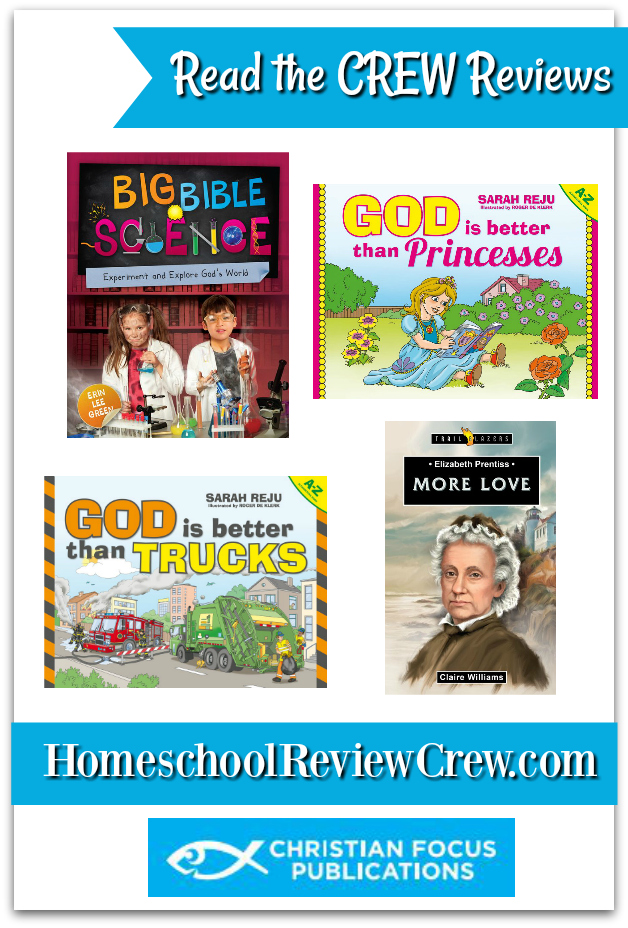
It has been fun using Big Bible Science by Christian Focus as a supplemental science addition to our homeschool. The recommended ages for RTM (Read to Me) is 5-7; whereas, the recommend ages for RM (Read Myself) is 7-11.
We are enjoying using this book as a family. Most of my older kids (A, B, and C) are familiar with the concepts that are taught; whereas, the concepts are definitely new for my younger crowd (D, E, F and G). However, there is always something to be learned or discover regardless of age. What topics are included in this book? This book discusses gravity, Newton's Laws of Motion, Friction, Static Electricity, Acids and Bases, Combustion, Lunar Craters, Water Cycle, Basic Animal Classification, Anatomy and more!
There are 21 chapters or units in this book (referred to as Experiments). Above you can see Chapter 7 which is on Acids and Bases.
If you haven't guessed from the title, this curriculum uses the Bible and is taught through a Christian worldview. Each chapter contains a scripture verse that reinforces the science concept being taught! You are encouraged to begin each lesson in prayer - for God to open the minds of your children and help them concentrate, for the teacher to have patience (that's me), and for everyone to enjoy learning about God's creation - I love this. The core of this curriculum is learning about God's Word while learning about God's world as they are closely associated with one another.
In addition, each chapter has six main components: objectives (the science learning goals), materials list (what you will need for the lesson), the big idea section (explains the lesson scientifically and ties in the biblical perspective and verse), activities (scientific demonstrations, games and experiments), an apply it section (ideas on how to find examples of the lesson in the world) and a go beyond section (challenges advanced and older students to think and experiment further). Each lesson is fairly short, 2-4 pages and the entire softcover book is under 100 pages. I think these shorter lessons keep the kids engaged and asking questions. The younger kids were less likely to get distracted. The experiments worked really well in our homeschool environment as the materials and supplies were easily found around our home and the kids were eager to participate. The kids appreciated the color illustrations and photographs.
We learned about static electricity in unit 6.
We learned about combustion reactions in unit 8.
Unit 10 took us to space as we explored lunar craters.
A sampling of our craters.
Lunar craters rock!
Units 13 and 14 helped us learn basic animal classification.
Classifying our animals into mammals, birds, reptiles, amphibians and fish. We even had a small group of invertebrates.
Two other sections worth noting are the notebooking page near the front of the book and the mini biographies located at the back of the book. I just finished teaching a Science Fair course at our weekly CoOp and I really appreciate the section on good habits for a young scientist. There are great tools and tips for keeping a science notebook.
There are 11 mini biographies to look through at the very end of the book. Our family found these interesting.
Additional activities to accompany this book can be found on the book's page online (Big Bible Science) under additional downloads. We checked them out and enjoyed the extra activities for learning about the water cycle.
Example of additional activities found online
The kids really enjoyed reading A Drop Around the World by Barbara Shaw.
This is just a sampling of the fun we have had so far as we journey through this book. If you are looking for a science book that incorporates the Bible in a fun and exciting way for your young learners, then this is the book for you. I love watching science come alive with my kids as they continue to explore and ask questions about the world in which we live. May my kids continue to grow their minds and love for Christ in all that they do.
Be sure to click on the banner below to visit the Homeschool Review Crew blog to read more reviews of Big Bible Science as well as other books from Christian Focus.

You can engage with Christian Focus on social media @:

















No comments:
Post a Comment